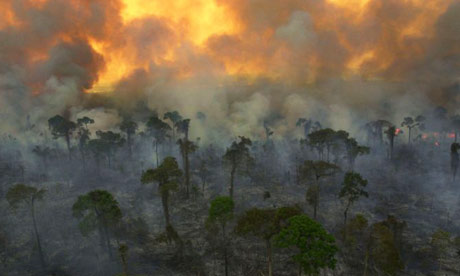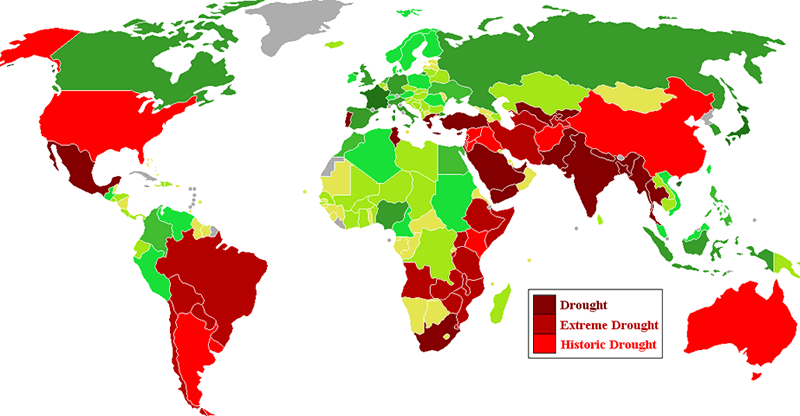Until now, most discussion of climate change has been about what scientific evidence shows is likely to happen between now and 2100. However, scientific research shows that the carbon dioxide gas released from burning fossil fuels lasts in the atmosphere much longer than mere decades.
David Archer, a leading climate researcher who teaches at the University of Chicago, has written a new book that looks at carbon dioxide's "long tail" and what it means for changes on Earth in the future.
Carbon dioxide emissions could last millenniums, expert says
Indian experts find bacteria to beat global heat
In a major breakthrough that could help in the fight against global warming, a team of five Indian scientists from four institutes of the country have discovered a naturally occurring bacteria which converts carbon dioxide (CO2) into a compound found in limestone and chalk.
When used as an enzyme — biomolecules that speed up a chemical reaction — the bacteria has been found to transform CO2 into calcium carbonate (CaCO3), which can fetch minerals f economic value, said Dr Anjana Sharma from the biosciences department of RD University, Jabalpur, who was part of the Rs 98.6 lakh project sponsored by the department of biotechnology (DBT) under the Union science and technology ministry.
TVNL Comment: The problem with too much CO2 is that we have been poisoning the oceans. It is ocean plant life that consume CO2 and provide us with oxygen. If we don't stop killing the ocean we will not have enough oxygen to survive. That is the REAL problem.
The tropics on fire: scientist's grim vision of global warming
 Soaring greenhouse gas emissions, driven by a surge in coal use in countries such as China and India, are threatening temperature rises that will turn damp and humid forests into parched tinderboxes, said Dr Chris Field, co-chair of the UN's Nobel prize-winning Intergovernmental Panel on Climate Change (IPCC).
Soaring greenhouse gas emissions, driven by a surge in coal use in countries such as China and India, are threatening temperature rises that will turn damp and humid forests into parched tinderboxes, said Dr Chris Field, co-chair of the UN's Nobel prize-winning Intergovernmental Panel on Climate Change (IPCC).
Climate change even worse than predicted: expert
 It seems the dire warnings about the oncoming devastation wrought by global warming were not dire enough, a top climate scientist warned Saturday.
It seems the dire warnings about the oncoming devastation wrought by global warming were not dire enough, a top climate scientist warned Saturday.
It has been just over a year since the Nobel-winning Intergovernmental Panel on Climate Change (IPCC) published a landmark report warning of rising sea levels, expanding deserts, more intense storms and the extinction of up to 30 percent of plant and animal species.
Catastrophic Fall in 2009 Global Food Production
 The countries that make up two thirds of the world's agricultural output are experiencing drought conditions. Whether you watch a video of the drought in China, Australia, Africa, South America, or the US , the scene will be the same: misery, ruined crop, and dying cattle.
The countries that make up two thirds of the world's agricultural output are experiencing drought conditions. Whether you watch a video of the drought in China, Australia, Africa, South America, or the US , the scene will be the same: misery, ruined crop, and dying cattle.
Acid oceans 'need urgent action'
 The declaration, supported by Prince Albert II of Monaco, builds on findings from an earlier international summit.
The declaration, supported by Prince Albert II of Monaco, builds on findings from an earlier international summit.
More than 150 top marine researchers have voiced their concerns through the "Monaco Declaration", which warns that changes in acidity are accelerating.
Interior Ignored Science When Limiting Water to Grand Canyon
 Interior Department officials ignored key scientific findings when they limited water flows in the Grand Canyon to optimize generation of electric power there, risking damage to the ecology of the spectacular national landmark, according to documents obtained by The Washington Post.
Interior Department officials ignored key scientific findings when they limited water flows in the Grand Canyon to optimize generation of electric power there, risking damage to the ecology of the spectacular national landmark, according to documents obtained by The Washington Post.
A Jan. 15 memo written by Grand Canyon National Park Superintendent Steve Martin suggests that the department produced a flawed environmental assessment to defend its actions against environmentalists in court.
More Articles...
Page 185 of 201

 Environmental Glance
Environmental Glance






























